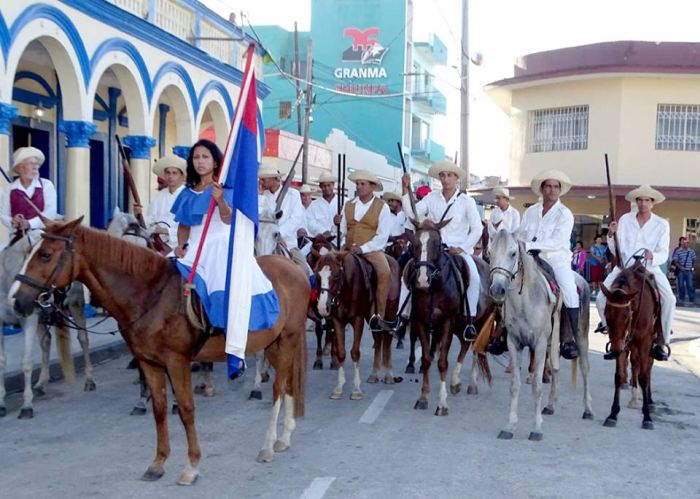
On August 22, 1980, the executive committee of Cuba’s Council of Ministers approved Decree no. 74 to establish October 20 as Cuban Culture Day
October offers two important anniversaries in the history of Cuba, the beginning of the country’s wars of independence and national Cuban Culture Day.
History is very profound and rich, but in a few words, October 10, 1868, is the moment that marked the beginning of the wars of independence against Spain, launched with the rallying cry of Carlos Manuel de Céspedes in La Demajagua.
On October 18, that year, the taking of Bayamo by the Liberation Army was begun, and at 11:00pm on the 20th, Spanish authorities signed their capitulation.
Amidst the jubilation and the incessant humming of a melody known by many in the crowd, the story goes that voices called for some verses to sing, and Perucho Figueredo, sitting on horseback, crossed his leg over the saddle, and put the words to music he had composed the previous year. Thus, the national anthem of Cuba was born.
A beautiful day, October 20, 1868 – music, poetry, art, and rebellion united.
Culture and nation were forged. A historic moment in Bayamo, the city that later preferred being burned down to surrendering to the enemy.
To recall these events, October 20 was declared Cuban Culture Day.
THE BAYAMESA
The history of today’s Cuban national anthem goes back to the dawn hours of August 14, 1867, when the War Committee, meeting in the home of patriot
Perucho Figueredo, gives him the historic order. “Now it’s your turn, you’re the musician, compose our Marseillaise.”
It should be noted that this Bayamesa has nothing to do with the one composed by Manuel de Céspedes, Francisco Castillo, and José Fornaris in 1851, that goes, “Do you not remember, gentle Bayamesa/ that you were my shining sun/ and smiling, on your languid forehead/ I passionately planted a soft kiss?”
Returning to the march that would become the national anthem, on May 8, 1868, Figueredo asked a tilesetter, musician, and director of the municipal band, Manuel Muñoz Cedeño, to orchestrate the piece, which a month later was played in the San Salvador de Bayamo parrish church during a solemn te deum for the corpus christi festivities, with prominent colonial figures on hand, including the city’s military governor Lieutenant Calvary Colonel Julián Udaeta. It was later repeated in the streets during a procession.
José Martí, the most universal of Cubans, who organized the war of 1895, calling it the Necessary War, in addition to being an extraordinary poet, had the vision to rescue the march from oblivion after the vicissitudes of battle. To do so, he sought the assistance of another musician and patriot from Camagüey, Emilio Agramonte, who transcribed it onto the staff based on the memories of émigrés in New York.
Martí published this transcript in issue no. 16 of the newspaper Patria, dated August 25, 1892, under the title of “La Bayamesa, Cuban Revolutionary Anthem, by Pedro Figueredo.”
He wrote with his always beautiful, precise words, “Patria publishes today, so that all mouths might intone it and keep it in their homes; so that they feel the pain and love, the tears of those who heard it in sublime combat for the first time. So that it stirs the blood in young veins, the anthem whose chords which, in our homeland’s most beautiful and solemn moment, roused dormant dignity in the chests of men. One still trembles upon recalling that marvelous scene.”
The original score was lost, perhaps burned. It is known that in 1869, when Pedro Figueredo had sought refuge in Morell’s Santa María estate, in Camagüey, he re-wrote the piece at the request of one of the owner’s daughters, Adela Morell, who in 1912 sent it to Fernando Figueredo, Perucho’s nephew, to deliver it to the National Museum.
The National Museum of Music now preserves the score that he wrote for Adela Morell, on November 10, 1869, signed Perucho Figueredo.
CUBAN CULTURE DAY
On August 22, 1980, the executive committee of Cuba’s Council of Ministers approved Decree no. 74 to establish October 20 as Cuban Culture Day.
The decree – signed by Fidel Castro, Council of Ministers president; Armando Hart, minister of Culture; and Osmany Cienfuegos, Council of Ministers and executive committee secretary – states in one of its “whereas” clauses, “the national anthem of Cuba, La Bayamesa, found its words amidst combat and triumph… in the pen of its musical creator, Perucho Figueredo, who sitting on his feverish steed … composed the octave that since then our people have sung and will eternally sing as their anthem of struggle and of victory … the great value of what would be the first work of Cuban culture.”
Thus, in its first “therefore,” the decree establishes October 20 as Cuban Culture Day, “in commemoration of October 20, 1868, date on which… the people intoned for the first time… “La Bayamesa”…with its inflamed music and patriotic poetry, an open call to liberating insurrection and the abolition of slavery, and an artistic expression of this profound, irreversible act which defines Cuban conscience, the greatest and most authentic expression and symbol of our national culture.”
A celebration of Cuban culture, that is, no doubt, “the nation’s soul and shield.”
 Escambray ENGLISH EDITION
Escambray ENGLISH EDITION





Escambray reserves the right to publish comments.